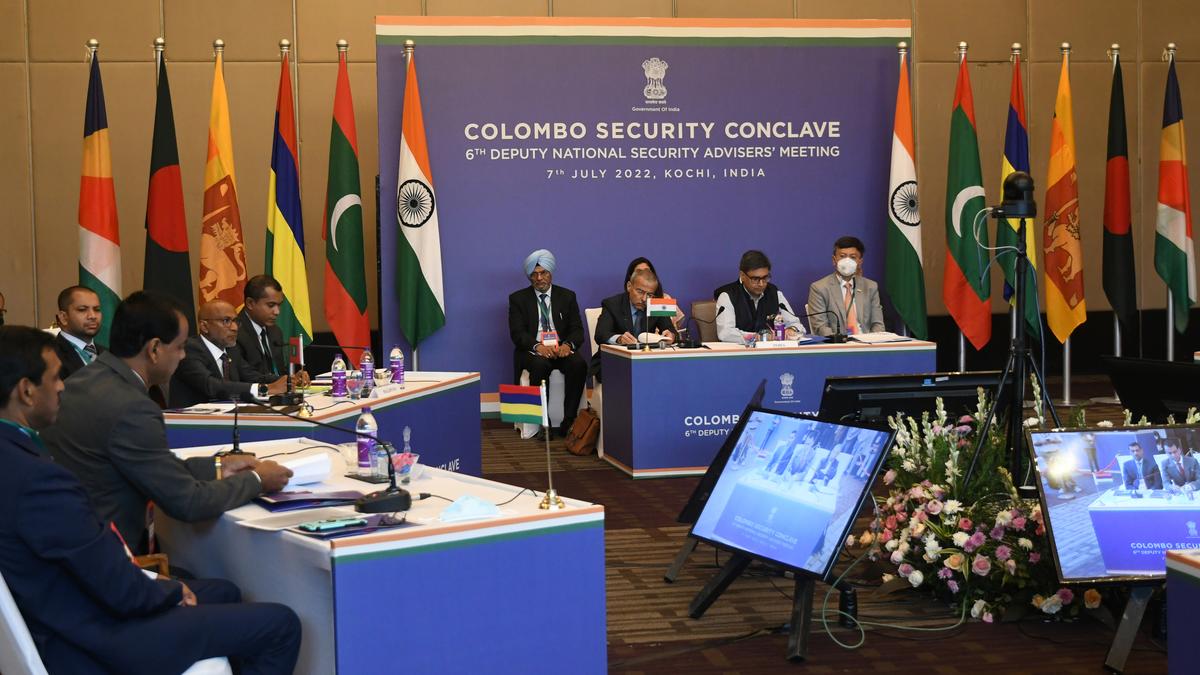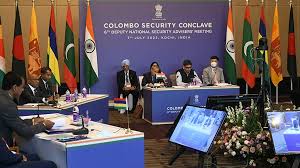Colombo Security Conclave

- 11 Oct 2024
In News:
The Colombo Security Conclave (CSC) reached a milestone on August 30, 2024 with India, Sri Lanka, the Maldives and Mauritius signing a Charter and a memorandum of understanding, for the establishment of the CSC secretariat.
Key Facts:
Background of CSC:
- Originally called the NSA Trilateral on Maritime Security, the CSC was established in 2011 among India, Sri Lanka, and the Maldives. The initiative aimed to bolster maritime security in the Indian Ocean Region.
Membership:
- The founding members include India, Sri Lanka, and the Maldives. Mauritius joined in 2022, and Bangladesh became a member in 2024. Seychelles participates as an observer state.
Goals of CSC:
The CSC aims to foster cooperation in five main areas:
- Maritime safety and security
- Counterterrorism and prevention of radicalization
- Combating trafficking and transnational organized crime
- Cybersecurity and safeguarding critical infrastructure
- Humanitarian assistance and disaster relief
Defence Exercises:
- In November 2021, India, Sri Lanka, and the Maldives held Exercise Dosti XV in the Maldives, marking their first joint military exercise in the Arabian Sea under the CSC framework.
Colombo Security Conclave (CSC)

- 03 Sep 2024
In News:
The Colombo Security Conclave (CSC) recently marked a significant milestone with the signing of the Charter and the Memorandum of Understanding (MoU) for the establishment of its Secretariat in Colombo. This initiative aims to strengthen regional security collaboration among member states.
Key Features of the Colombo Security Conclave
- Member States: The CSC comprises five member countries:
- India
- Bangladesh
- Sri Lanka
- Maldives
- Mauritius
Additionally, Seychelles participates as an observer nation.
- Core Objectives: The primary goal of the CSC is to enhance regional security by addressing transnational threats and challenges that are common concerns for member states. This includes a collaborative approach to ensure stability and safety in the region.
Origin and Evolution
- The CSC originated as the Trilateral for Maritime Security Cooperation, established through trilateral meetings among National Security Advisors (NSAs) and Deputy NSAs from India, Maldives, and Sri Lanka starting in 2011.
- The initiative faced a setback after 2014 due to heightened tensions between India and the Maldives.
- It was revived and rebranded as the CSC in 2020, expanding its membership to include Mauritius and, more recently, Bangladesh.
Structure and Cooperation
- The conclave facilitates interactions among NSAs and Deputy NSAs of member countries, fostering dialogue and cooperation on security matters.
- Cooperation under the CSC is organized around five key pillars:
- Maritime Safety and Security
- Countering Terrorism and Radicalization
- Combating Trafficking and Transnational Organized Crime
- Cybersecurity and Protection of Critical Infrastructure
- Humanitarian Assistance and Disaster Relief
Permanent Secretariat
- The establishment of a permanent Secretariat in Colombo is expected to enhance coordination and streamline operations among member states, bolstering the efficacy of the CSC in addressing regional security issues.
